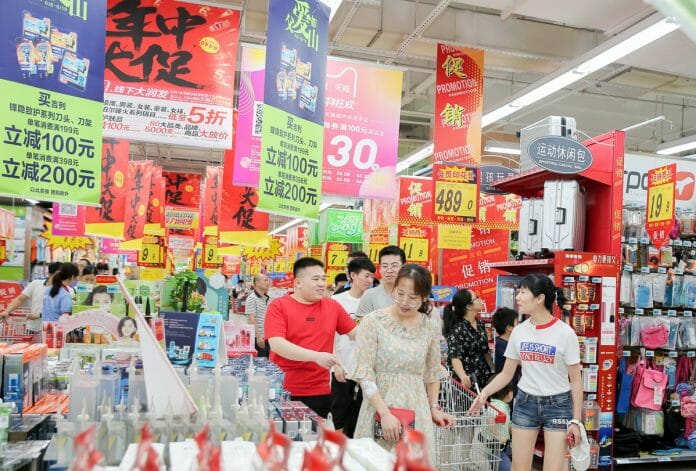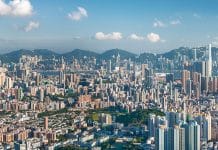China has made a number of pledges recently to revive the economy’s recovery and improve the business environment as concerns about the growth outlook continue to mount.
The statements from the government and Communist Party over the past month are largely broad assurances to lift spending on things like consumer goods and cars, encourage private companies to expand investment, and to make it easier for businesses to access funding.
However, Beijing has stopped short of announcing major monetary or fiscal stimulus, like cash subsidies to consumers to spend more, or a ramping up of construction spending like it did in previous downturns.
Here’s a snapshot of the recent measures announced:
Consumer Goods
Thirteen government departments outlined a plan on July 18 to boost household spending on everything from electric appliances to furniture. Local authorities are encouraged to help residents refurbish their homes, and people should get better access to credit to buy household products, according to the measures announced.
On July 28, three government agencies outlined a plan to increase manufacturing of small consumer goods — or the so-called light industry sector, which makes up more than a quarter of China’s exports. Steps will be taken to increase sales of green and smart home goods in rural areas, and expand the use of battery products in electric cars, power stage and telecommunications. An exchange dedicated to helping small firms get access to funds will also be expanded.
The National Development and Reform Commission, China’s top economic planning agency, released a comprehensive document on July 31 repeating many of the pledges so far. The document focuses on removing government restrictions on consumption, such as car purchase limits, improving infrastructure and holding promotional events like food festivals.
Property
The Communist Party’s Politburo, its top decision-making body, signalled an easing of property policies at its July meeting. The official readout omitted President Xi Jinping’s signature slogan that “houses are for living, not for speculation,” fuelling speculation that some of the tough restrictions imposed in recent years to rein in the property market would be reversed.
On July 27, China’s housing minister urged financial regulators and lenders to strengthen efforts to revive the sector. He called for homebuyers who had paid off previous mortgages to be considered as first-time purchasers. Up to now, many buyers in big cities who have a mortgage history but don’t currently own a property are subject to higher down-payment rules.
Financial regulators on July 10 extended loan relief for developers to ensure the delivery of homes under construction. The PBOC has also hinted that lenders will be able to renegotiate mortgage contracts or extend new loans to lower the financing costs on home loans.
Cars
The NDRC released a 10-step plan on July 21 to increase car purchases, particularly for new-energy vehicles, including lower costs for electric-vehicle charging and extending tax breaks. In June, the Ministry of Commerce launched a six-month campaign to boost car purchases and drive electric vehicle adoption in rural areas.
Technology
The Communist Party and government issued a rare joint pledge on July 19 to improve conditions for private businesses after wrapping up an almost two-year regulatory crackdown of the technology sector. Beijing outlined 31 measures that included promises to treat private companies the same as state-owned enterprises, consult more with entrepreneurs on drafting policies, and cut market entry barriers for firms.
On July 13, the top internet regulator released 24 guidelines for ChatGPT-style services, loosening some restrictions it proposed several months previously. On July 27, the central bank asked lenders and financial markets to provide more support for innovation and tech-related acquisitions, and to boost investment in startups.
Construction Projects
The National Development and Reform Commission released a plan on July 24 encouraging private firms to invest in key industries like transportation, water conservation, clean energy, new infrastructure, advanced manufacturing and modern agricultural facilities. Local governments have submitted more than 2,900 projects, worth a total of 3.2 trillion yuan ($445 billion), that businesses can invest in. The NDRC will also seek to finance the projects through bank loans and real estate investment trust products.
The government is also planning to boost the renovation of so-called urban villages. It will seek more private capital in the projects to expand domestic demand and push forward development of cities, the State Council, chaired by Premier Li Qiang, said on July 21.
Interest Rates and Currency
The PBOC on June 13 cut its main policy interest rates in a surprise move, providing monetary stimulus to the economy. The move came ahead of data showing a slump in real estate, a worrying decline in private sector investment and record joblessness among young people.
The People’s Bank of China on July 20 adjusted some rules to allow companies to borrow more from overseas, opening the door for more foreign capital inflows. It also set a stronger daily fixing for the currency. – Bloomberg









